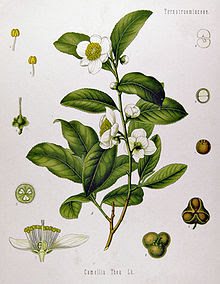Submitted by Aspergillus Administrator on 7 August 2009
There are some specialist teas that are fermented by Aspergillus and this has apparently led to a widespread misunderstanding amongst those people who consider themselves to have problems eating food that contains some Aspergillus material or other molds. They are tending to avoid all teas as potentially containing traces of Aspergillus.
This article points out quite rightly that most tea sold in the western world is not fermented using Aspergillus but is in fact prepared using a quite different process called ‘oxidation’ – a mold free process where crushed leaves are left for their internal enzymes to carry out the natural oxidation process for varying amounts of time (adjusted according to the final taste required) and are then heated to stop the oxidation and dry out the leaves. The timing of the heating and drying stage is crucial to prevent mould growth.
We wrote an article on this issue some time ago and noted at that time that most tea is made by a mold-free process.
We wrote an article on this issue some time ago and noted at that time that most tea is made by a mold-free process.
Having said that it would be very difficult to describe tea as an ‘Aspergillus-free’ drink as by its nature it is plant material that will be exposed to Aspergillus at various times in its life so the leaves will always be likely to hold some Aspergillus spores.
In fact the same would go for most plant foods as Aspergillus is an important component of soil and most plant material will have been in contact with soil and windblown soil. The amount of mold contaminating the plant material is probably very small and some will probably be washed off during preparation but will still not be completely free of Aspergillus material.
This is not a problem for most people and we have no reliable information telling us that anyone is badly effected by eating plant food carrying this much Aspergillus – even those who have increased allergy to this fungus.
In fact the same would go for most plant foods as Aspergillus is an important component of soil and most plant material will have been in contact with soil and windblown soil. The amount of mold contaminating the plant material is probably very small and some will probably be washed off during preparation but will still not be completely free of Aspergillus material.
This is not a problem for most people and we have no reliable information telling us that anyone is badly effected by eating plant food carrying this much Aspergillus – even those who have increased allergy to this fungus.
Fermented teas are of course completely different. They have been cultured with the mould and will contain many thousands of times more Aspergillus material compared with non-fermented tea.
News archives
Showing 10 posts of 953 posts found.
-
Title
Date



